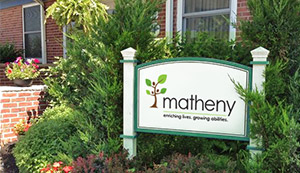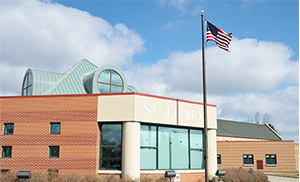Posted on August 28, 2013 by Matheny

From left, Jenna, Jacob, mother Lauren and sister Callie.
Jacob Poleyeff has been dropping off and picking up his 11-year-old daughter Jenna at Matheny since May 2012, when she was admitted with a rare seizure disorder known as Lennox-Gastaut Syndrome.
“I would estimate that I’ve now taken about 250 trips up or down Highland Avenue in Peapack,” he says. “I can count on one hand the total number of cars that have passed me in the other direction on all 250 trips. And I have seen zero children – not one – on that road the entire time.”
Yet, a proposed expansion and renovation by Matheny to add 40 beds and about 60 employees was defeated by the Peapack-Gladstone Land Use Board in 2011, primarily based on complaints by neighbors that the increased traffic caused by the expansion would cause the road to become more unsafe and imperil the lives of those using it. That decision was recently upheld by a Superior Court judge in Somerset County.
The traffic issue, says Poleyeff, “is really nonsense. I would encourage anyone curious to take a drive up there and try to imagine how 60 additional cars a day – what’s that, one every 12 minutes? – could possibly impact the safety or even affect the lifestyles of these residents. While you’re at it, stop and visit Matheny and see some of the kids and the activities that take place. The entire outrage of what’s going on up there will become quite clear.”
“My daughter,” adds Poleyeff, “was lucky that a place opened up for her, but so many kids and their folks are waiting desperately. Forty openings doesn’t sound like a lot, but for those families, it would have made a world of difference.”
Posted on August 26, 2013 by Matheny
 By Gary E. Eddey, MD
By Gary E. Eddey, MD
Vice President for Medical Affairs and Chief Medical Officer
The most important aspect of the care of Lesch-Nyhan patients from both the practitioner and health system perspectives is collaboration with the parents and/or patient. A close second is the ability of the healthcare provider to demonstrate adaptability of the system and individuals involved when confronted with new challenges.
Lesch-Nyhan is a rare X-linked, recessive genetic disorder associated with cognitive impairment, hyperuricemia, renal involvement and the hallmark symptom, severe self-injurious behaviors. There are endless behavioral issues that have to be addressed when caring for a Lesch-Nyhan patient. Among them:
- Safety issues relating to transportation.
- Equipment issues relating to wheelchair seating systems.
- Availability of transition care.
For these issues and many more, it is important for a healthcare institution to recognize the necessity of crossing departmental and institutional lines. It is also important that healthcare providers be able to collaborate with parents and other relatives of LND patients.
Third in a series of four articles on Lesch-Nyhan Disease. For more information, feel free to call Gary E. Eddey, MD, at 908 234-0011, ext. 737.
Posted on August 23, 2013 by Matheny

Teresa Radebaugh, left, and Susan Pospischil.
Business was brisk at First Chance at Second Chance, the August 14th one-day sneak preview of all merchandise to be featured at the Second Chance Shop, the thrift shop operated by The Friends of Matheny, the auxiliary group that raises funds to benefit Matheny’s students and patients.
One of the busiest customers was Susan Pospischil from Defiance, MO, who was visiting Chester, NJ, resident Teresa Radebaugh. Pospischil was buying lots of sweaters and purses to take back to the Midwest, while Radebaugh was buying books and other items for her first grandchild, soon to arrive. During the regular Second Chance season, which resumes on September 3, Radebaugh volunteers at the shop.
The Second Chance Shop is located adjacent to the United Methodist Church on Jackson Avenue in Gladstone, NJ. The Friends of Matheny has raised more than $3 million for Matheny’s students and patients since its inception in 1983.
Posted on August 21, 2013 by Matheny

Dr. Kenneth Robey.
Because of their medical complexities, children and adults with complex disabilities find the transition to and from acute care hospitals very difficult. Often hospital staff members are not familiar with the patients and not well prepared to address all of their complex needs.
Two years ago, Matheny received a grant from the Robert Wood Johnson Foundation’s New Jersey Health Initiatives program to help us address this problem. A key element was the appointment of a full-time transition care nurse, who helps provide an unusual degree of interaction between Matheny staff members and acute care hospital staff members.
On Friday, September 6, three Matheny staff members will participate in a conference devoted to this subject. The conference is being held at Morristown Medical Center and is sponsored by MMC and the Northern New Jersey Network of the Developmental Nurses Association. The three Matheny presenters are:
- Kenneth Robey, Ph.D, director of the Matheny Institute for Research in Developmental Disabilities, who will give the keynote address: “The Health Care Transition for Persons with Intellectual and Developmental Disabilities.”
- Jeanne Lavelle, BSN, Matheny transition care nurse, who will speak about “Innovations in Care Coordination in Hospitals for Persons with I/DD.”
- Gaila Call, BSN, CWOCN, Matheny wound, ostomy and continence nurse, who will talk about “Steps That Will Make a Difference During Hospitalization.”
Atlantic Health System, Robert Wood Johnson University Hospital and Somerset Medical Center are Matheny’s partners in the transition program. More information about the conference can be obtained by calling 1-800-247-9580 or emailing dsykes@matheny.org.

Jeanne Lavelle, BSN, transition care nurse.
Posted on August 19, 2013 by Matheny

Jacob works on his math with Matheny School teaching assistant Kristin Barone.
When he was around 2½ years old, Jacob Rolaf showed signs of bruising and was diagnosed with mild hemophilia. About 4½ years later, he began to experience gastrointestinal bleeding and, as a result, needed to be treated with high doses of blood coagulation factors. A resulting infection caused him to develop septic shock and multi-organ failure. “Before that,” says Lisa Cohen, a social worker at Rutgers Robert Wood Johnson Medical School Hemophilia Center in New Brunswick, N.J., “he was an average kid. But he developed sepsis, multi-organ failure, central nervous system injury and seizure disorder. That really started all of his multiple medical issues.”
From that point on, Jacob was in and out of the hospital. At home in Toms River, N.J., he had special accommodations and lots of nursing support. Then his mother became ill and was unable to care for him physically. He was placed in an institution that provided transitional care to infants and children with specialized medical needs. “His hemophilia had stabilized,” Cohen says, “but we needed to find a long-term placement that had the therapies he needed and so he would not just sit all day.”
In December 2012, a representative of the state office of Child Protection and Permanency (formerly the Division of Youth and Family Services) contacted Matheny regarding permanent placement for Jacob. He eventually was admitted as a resident in May 2013. “He really needed a place like Matheny,” Cohen says. “Seeing him there is wonderful. You can see it on his face. You can see the difference.”
Posted on August 16, 2013 by Matheny

Dr. Gary E. Eddey.
By Gary E. Eddey, MD
Vice President for Medical Affairs and Chief Medical Officer
Protective devices are, at times, controversial, but they are essential to use for individuals with Lesch-Nyhan disease.
Professionals who are unfamiliar with LND may perceive the use of these protective devices as a form of restraint. But when protective devices are requested by the patient and used to safeguard the patient from him or herself, the outcome is an extraordinary feeling of comfort and safety. Not allowing the patients to use protective devices, in fact, would violate their autonomous rights.
Individuals with LND appear at times to be very high functioning in an intellectual way, although they are limited in some aspects of their cognition. Their self-injurious behavior goes against what they want to do. So, the behaviors they exhibit to parents, caregivers and to themselves can be very difficult to understand. Caregivers need continuing support on how to best cope with and care for those individuals in order to promote the positive aspects of the person. As mentioned previously, treatment of individuals with LND should include use of a behavioral technique commonly referred to as selective ignoring, with redirection of activities.
Second in a series of four articles on Lesch-Nyhan Disease. For information, feel free to call Dr. Eddey at 908 234-0011, ext. 737.
Posted on August 14, 2013 by Matheny

Paul West in music class with student Aidan McNamara and teaching assistant Jackie Haller.
Paul West has filled several roles at Matheny and done them all well. As a teaching assistant in the Matheny School, he was named Paraprofessional of the Year. He has also worked as a recreation therapy assistant and a one-on-one aide. Now, he’ll be doing what he loves most. He has been named the school’s new music teacher.
West has a Master of Fine Arts degree from the California Institute of Arts in Los Angeles and an undergraduate degree in music theory/composition from Montclair State University in Montclair, NJ. He was also part of a quartet that was nominated for a Grammy Award earlier this year in the “Best Classical Compendium” category for a recording of the music of esoteric composer Harry Partch.
As music teacher at Matheny, West is looking forward to enhancing the music experiences of the students. “Teaching at Matheny,” he says, “is no different than composing music. One needs to break down specific subject matters, analyze their most basic elements and reassemble the information in a relatable way.”
Posted on August 12, 2013 by Matheny

Dancer/choreographer Dion Alston, performing “Every Teardrop is a Waterfall” with dance facilitator Elizabeth Zelesny.
For the 18th consecutive year, Matheny’s Arts Access Program has received a grant from the New Jersey State Council on the Arts. The grant, in the amount of $34,267, is for the first year of a three-year grant cycle beginning in fiscal year 2014.
Along with the grant, Arts Access received a Citation of Excellence, honoring “New Jersey arts organizations, programs and projects that receive the highest possible assessment of their Council grant applications by esteemed, independent panels of their peers.” The program once again was also named a Designation of Major Impact.
According to the NJSCA, “Arts organizations are designated by the Council as Majors in recognition of their long history of artistic excellence, substantial programming, broad public benefit and a superior review through the panel process.”
Arts Access empowers individuals with disabilities to create art without boundaries. Through the use of innovative systems and techniques, participants can take part in the visual, performing and literary arts. Regardless of their disability, the artists are provided with the tools and materials needed to produce complete pieces of work.
Earlier this year, Arts Access received a $10,000 Challenge America Fast-Track grant from the National Endowment for the Arts (NEA) to support the Full Circle 2013: Reflections, the program’s annual event, which will celebrate Arts Access’ 20th anniversary on November 2. Congressman Leonard Lance (NJ-07) will be honorary chair of Full Circle.

Arts Access artist Ellen Kane in front of her painting, “Half Circle.”
Posted on August 9, 2013 by Matheny

Dr. Gary E. Eddey
By Gary E. Eddey, MD, Vice President for Medical Affairs and Chief Medical Officer
Matheny has been providing residential programs for individuals with Lesch-Nyhan Disease for more than four decades, and currently five young men and one young woman are under Matheny’s care.
Lesch-Nyhan is a rare X-linked, recessive genetic disorder associated with cognitive impairment, hyperuricemia, renal involvement and the hallmark symptom – severe self-injurious behaviors. LND is usually diagnosed in the first few months of life as a developmental delay and may be diagnosed initially as cerebral palsy. The behavioral aspects of Lesch-Nyhan, such a self-mutilation and aggressive behavior, are involuntary and not under the patient’s control. These behaviors usually begin between the ages of three and six months and often escalate as the patient ages and becomes more physically able to cause self-injury.
Treatment for LND patients should include:
• Judicious use of protective devices.
• Utilization of a behavioral technique commonly referred to as selective ignoring, with redirection of activities.
• Occasional use of medications.
The behavioral strategy that Matheny has long employed is one of selective ignoring and distraction. We have an interdisciplinary team of people who have multiple years of hands-on experience working with people with LND, and we constantly re-educate all staff in order to maintain the most consistent continuity of care around that model.
This is the first in a series of four articles on Lesch-Nyhan Disease.
Posted on August 7, 2013 by Matheny

Matheny vice president of operations Chris King, left, and pharmacy technician Denise Bettinger receive New Jersey Smart Workplace and Drive Less Somerset Employer Challenge awards from Michael Camerino, chair of the Ridewise board of directors, second from right, and Shadow Traffic/Metro Networks traffic reporter Bernie Wagenblast.
Matheny received three awards at the annual employer recognition breakfast held July 25 by Ridewise, the source for travel alternatives in Somerset County, NJ. The three awards:
• New Jersey Smart Workplaces Platinum Award (one of 19 employers honored).
• Second place in the Drive Less Somerset competition, which encourages individuals to limit driving in favor of active transportation.
• Second place in the “Drive Less Somerset Challenge,” won by pharmacy technician Denise Bettinger in competition with all registered employees throughout Somerset County.
More than 55 businesses and four municipalities were honored as New Jersey Smart Workplaces at the event, held at Maggiano’s Little Italy in Bridgewater, NJ. “The event,” said Donna Allison, Ridewise executive director, “is an opportunity for the agency to honor organizations, local municipalities and schools that demonstrate leadership and are forward thinking in the area of sustainable transportation.”
Posted on August 5, 2013 by Matheny

Linda Horton, left, with a satisfied shopper at First Chance at Second Chance in 2012.
On Wednesday, August 14, bargain shoppers will get a preview of the merchandise to be featured next fall at the Second Chance Shop, the thrift shop operated in Gladstone, NJ, by The Friends of Matheny, the auxiliary group that raises funds to benefit Matheny’s students and patients. That’s the date for “First Chance at Second Chance,” a one-day reopening of the shop from 8:30 a.m. to 5:30 p.m.
According to Linda Horton, the Matheny trustee and Peapack, NJ, resident who manages the shop, “This is everyone’s opportunity to purchase all of our new merchandise before we re-open on September 3. The shop is super loaded with exciting items.”
The shop is located adjacent to the United Methodist Church on Jackson Avenue. The Friends of Matheny has raised more than $3 million since the group was started in 1983.
Posted on August 2, 2013 by Matheny

Pearl Chiang, RN, in front of her artwork.
Pearl Chiang works as a nurse at Matheny during the day, but at night, when she wants to relax, she paints. “Once I am focused,” she says, “all of my worries disappear. I paint little, cute mermaids without a single speck of sadness, and I realize that I can be as happy and worry-free as they are.”
During the month of August, Chiang’s art will be on display at the Bridgewater Township Library at 1 Vogt Drive in Bridgewater, NJ. Title of the exhibit is “Happy Life” because, according to Chiang, they represent “the pure untainted happiness of childhood.”















